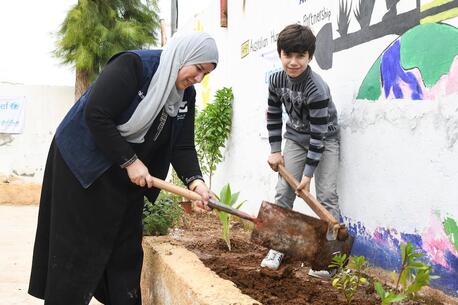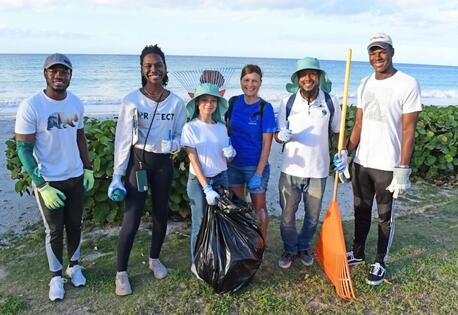
Why We're Optimistic About the Climate
Youthful optimism and determination are Gen Z's superpowers. Here's how some young UNICEF climate activists are working to drive meaningful change to preserve the health of the planet.
To many young people, feeling optimistic about the climate's future is like having hope for a business that's
declared bankruptcy. Often, it can seem like people are more interested in discussing escape plans to
Mars instead of simply taking action to maintain the health of the planet we're already on.
Needless to say, the road ahead isn't exactly looking too rosy. Still, some youth activists have turned the anxiety, gloom and doom over the looming threat of climate change into hopes, dreams and tangible action.
Here, they share what they're up against, how they’re making impactful change in their communities and why they remain optimists despite the climate emergency.
Youth are speaking out more than ever, but still not enough people are listening
Maria, a 14-year-old climate activist and UNICEF Youth Advocate for the Environment from Barbados, describes the eco-anxiety that is plaguing so many young people as a side effect of “the excuses they are faced with from those making decisions about why they can’t take necessary actions to combat the effects of climate change.”
Barbados is among the most vulnerable places in the world to the impacts of climate change. The island state is highly susceptible to hurricanes, rising temperatures, sea level rises and coastal inundation.
I push to help the environment in the best ways that I can because without a clean, healthy and safe environment, no one will thrive or even survive and future generations will not see or experience the natural wonders of this planet. — Maria, 14
“I push to help the environment in the best ways that I can because without a clean, healthy and safe environment, no one will thrive or even survive and future generations will not see or experience the natural wonders of this planet,” Maria says.
Climate and science are often categorized as adult spaces, but age and the pursuit of what is right do not always correlate. “Adults often treat Earth and resources like rats fighting over a chicken bone," says Maria. "Whereas I find that most young people look to find peace within themselves, each other and the planet they live on."
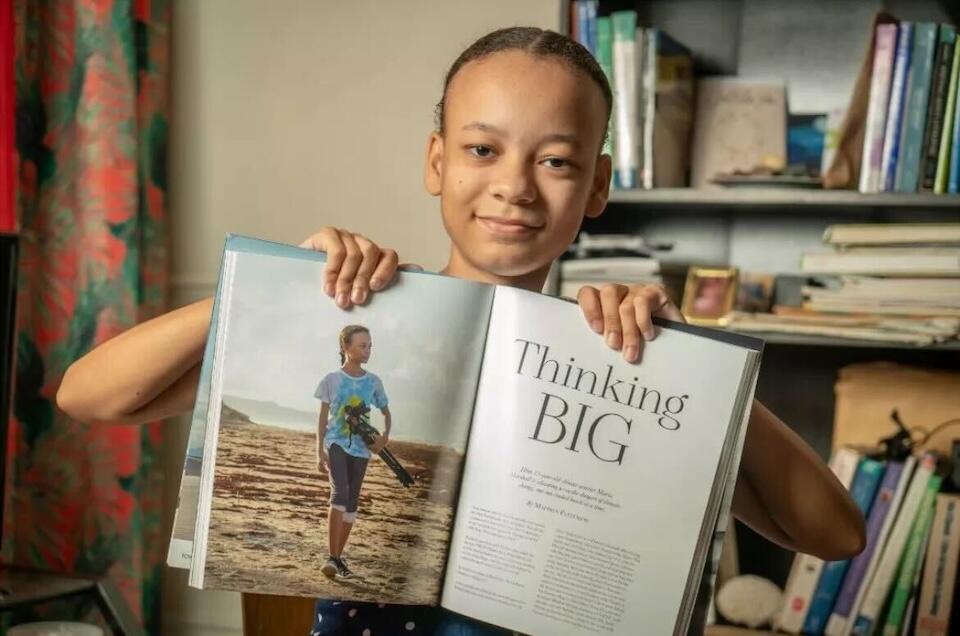
Protecting the environment is not an abstract concept for today's young activists
Like Maria, MaryGrace, a 20-year-old UNICEF Club member and public policy major at the University of Michigan, has grown up in the middle of an environmental crisis. Born in Flint, Michigan, she “witnessed the impact water insecurity has on a community,” she says.
In 2014, as a cost-cutting measure, Flint changed its water supply from Lake Huron to the Flint River, which corroded pipes, releasing lead and other toxins into the water. Unaware of the danger, residents continued using lead-contaminated water for drinking, cooking and bathing, despite the devastating effects lead can have, especially on children.
While many factors played into the Flint Water Crisis, one truth draws a through-line to all water insecurity issues: "Children cannot thrive when basic necessities are not met," MaryGrace explains. And a healthy environment is at the top of that list.
Children cannot thrive when basic necessities are not met. — MaryGrace, 20
Cynthia, 23, a climate activist and SAMHSA National Advisory Council member for the U.S. Department of Health and Human Services who is working toward a master's degree in public policy at Harvard University, brings up another point that helps explain why Gen Z is so outspoken on climate issues: Climate anxiety directly correlates with the mental health crisis their generation is experiencing.
“I have met young people across the U.S. and the world who have personally been impacted by the consequences of the climate crisis," Cynthia says. "Extreme natural disasters such as wildfires and hurricanes have uprooted many of my friends and climate activists. One indigenous Inuit boy from Alaska shared with me a heartbreaking story about how, over five months, he had lost five friends; all of them had fallen through the melted ice because they didn't know where it was safe to walk anymore.”
In all her mental health and climate advocacy work, she says she has seen time and again how fear of an increasingly uninhabitable planet is top of mind for those growing up as well as having to navigate the “inherited centuries of environmental degradation.”
But in all this turmoil, one question keeps popping up: why are so many adults not listening to young people or taking action in support of what they are saying?
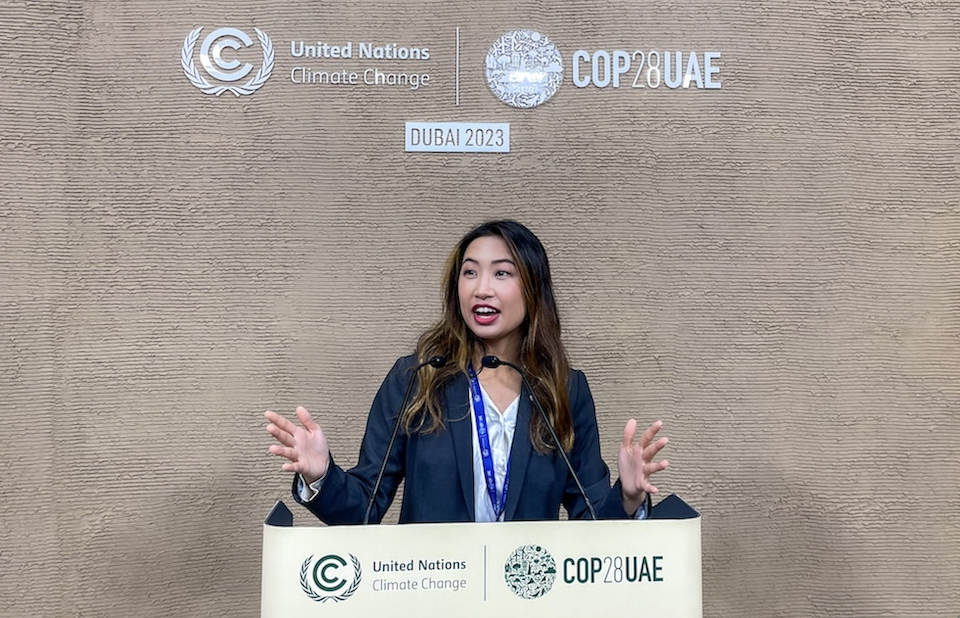
There's no time to waste
As young people experience firsthand the devastating effects of a changing climate, they aren’t waiting for adults to lead the way. Instead, they're taking action themselves.
What's stopping adults from taking urgently needed steps to protect the planet? The answer is not sensational: Most adults simply get caught up in their daily agendas. They may not spend as much time educating themselves about the existential threat of the climate crisis.
Young people, on the other hand, “are arming themselves with information to learn more about the impacts of climate change,” Maria says. After watching David Attenborough's videos and documentaries, she was inspired to create her own short film, “Little Thoughts on Big Matters,” and started a YouTube channel with the same name in hopes of having “a fraction of that impact.” Educating herself and creating her own content helped her articulate her thoughts better and give her confidence to start speaking to her peers about the climate crisis at a young age.
Find people who don’t think of youth activism as easy or glamorous, but are there to do the work together. That’s what will fulfill you. — Maria, 14
Young people are also often part of settings where they can foster community and connect with like-minded people. Maria, MaryGrace and Cynthia sought out places where a community of other young people was taking local climate action and met fellow advocates through UNICEF. “Find people who don’t think of youth activism as easy or glamorous, but are there to do the work together," Maria says. "That’s what will fulfill you.”
The climate action space may have previously been reserved for adults, but it lacked the most essential ingredient: optimism, which is fueled by having a dream. As Maria explains, "Dreams are what drive innovation."
MaryGrace’s experiences growing up in Flint led her to advocate for children through her UNICEF Club. Despite all she has seen, she still remains optimistic. “I firmly believe that nothing gets better unless we make it better, and fear does not promote positive change; it drives us to negative actions," she says. "In the case of the climate, our only hope is ourselves: regulation, individual sustainability and collective action."
"I remain optimistic about the environment because of the young people I work with at the University of Michigan, especially my WASH [water, sanitation and hygiene] project team," says MaryGrace. "They are a group of young leaders dedicated to educating, advocating and fundraising for sustainable infrastructure to reduce water insecurity. They inspire my confidence that we will win the fight against climate change.”
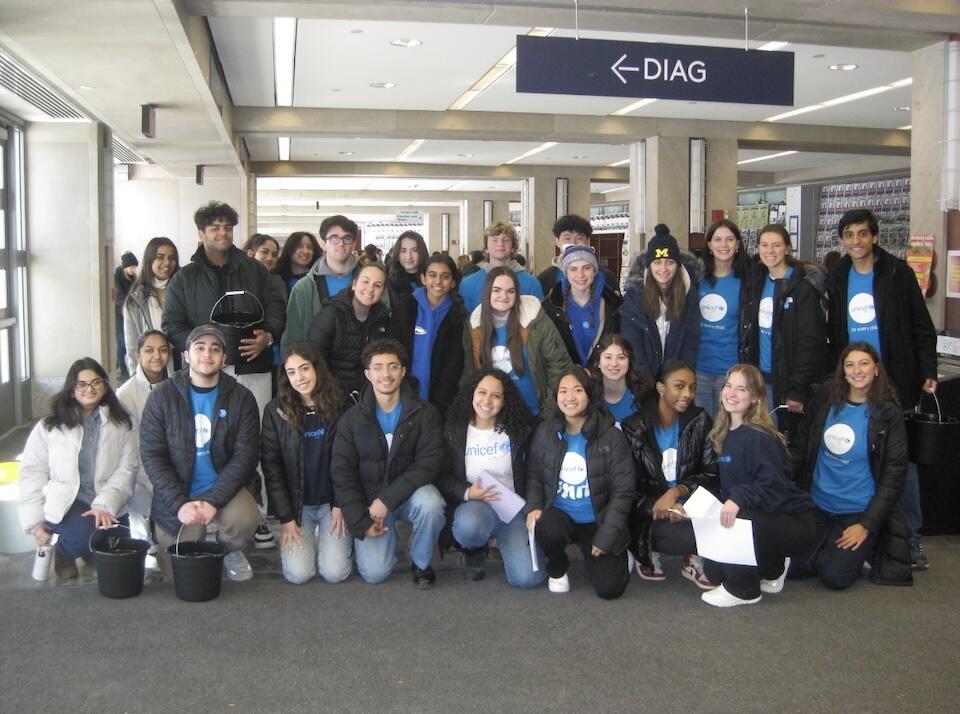
From eco-anxious to eco-optimist
Young people are no longer waiting for permission from anyone. They are taking action themselves. Last year, UNICEF USA created and fielded a survey of more than 3,000 young people between the ages of 16 and 24 across 15 countries to learn more about how youth are experiencing eco-anxiety and what they are doing about it.
The survey found that youth are most frustrated with not having more local, realistic and accessible solutions to climate change. Education and community are the two things that provide young people with the most agency and provide them with ways to take tangible action. It is education and community that also bridge the eco-anxiety and eco-optimism gap.
What is not in our control is the planet we were left with. What is in our control is the planet we choose to leave behind. — Cynthia, 23
Cynthia recently attended the COP28 Climate Conference as a speaker, where she presented on the intersection of climate and youth action in addition to supporting negotiators during the international negotiations, but her interest in climate issues began long before then. She started her journey by founding a UNICEF Club in high school to create a space to organize and plan local advocacy actions. That optimism remains with her today.
“Every ton of CO2 counts," she says. "Doing nothing to curb the crisis is part of what got us here in the first place. What is not in our control is the planet we were left with. What is in our control is the planet we choose to leave behind. I have remained optimistic about climate action by seeing my peers' immense energy and passion, many of whom have channeled their eco-anxiety into tangible action to hold our leaders accountable for climate action.”
The good news is that age is not preventing young people from taking action. It is this generation's greatest asset. And if you can already see awareness grow, community come together and change happen for the better, optimism will follow.
